10 Bullet Journaling Travel Spread Ideas that You Have to Copy
Bullet journaling is a versatile and creative way to organize your life, and it’s especially useful for planning your travels. With a bullet journal travel spread, you can keep track of your itinerary, budget, packing list, and memorable moments—all in one beautifully designed space. Here are some inspiring bullet journaling travel spread ideas to help you plan your next adventure in style.
Table of Contents
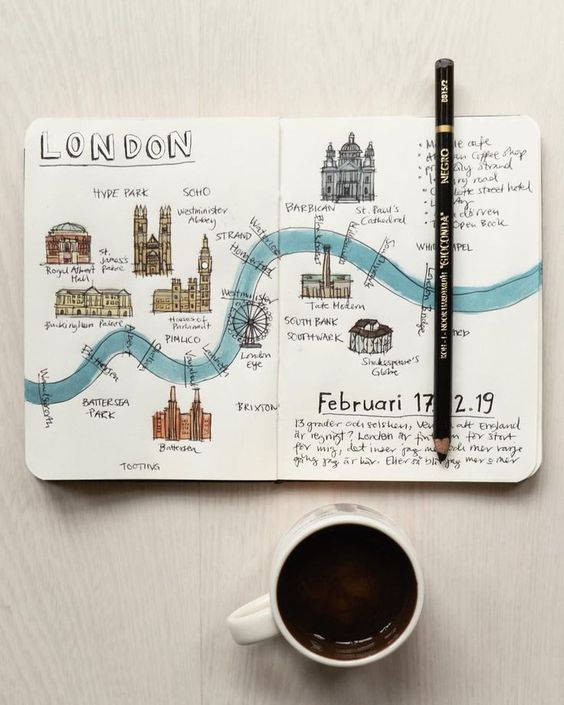
1. Destination Overview
Start with a destination overview page. This spread can include:
- Map: A small map highlighting your travel destination.
- Basic Info: Key details such as the country, city, language, currency, and time zone.
- Weather Forecast: Typical weather conditions for your travel dates.
- Travel Dates: The duration of your trip.
This overview gives you a quick reference guide and sets the tone for your travel planning.
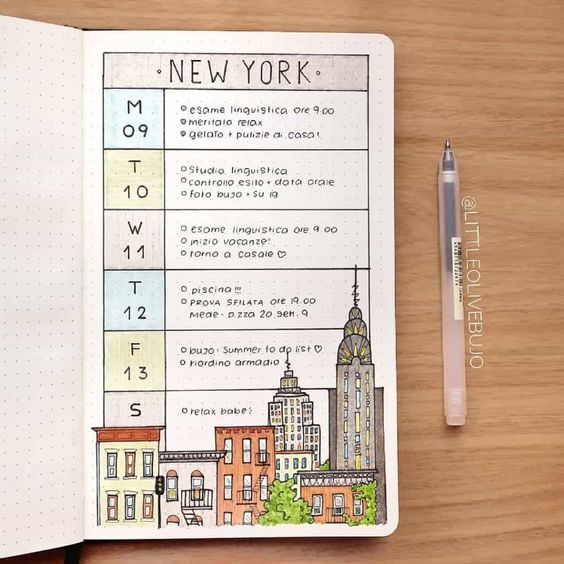
2. Itinerary Spread
An itinerary spread is essential for keeping track of your daily plans. Create a layout that outlines each day of your trip with space for:
- Dates and Days: Clearly mark each day and date.
- Activities and Attractions: List planned activities, tours, and sights to see.
- Meals: Note down any restaurant reservations or must-try local dishes.
- Transportation: Include details about flights, trains, buses, or car rentals.
This spread helps ensure you make the most of your time without missing any important events or activities.

3. Budget Tracker
Managing your travel budget is crucial. Design a budget tracker spread that includes:
- Total Budget: The overall budget for your trip.
- Expense Categories: Sections for accommodation, transportation, food, activities, shopping, and miscellaneous expenses.
- Daily Spending: Track your expenses day by day to stay within your budget.
A budget tracker helps you keep your finances in check and avoid overspending.
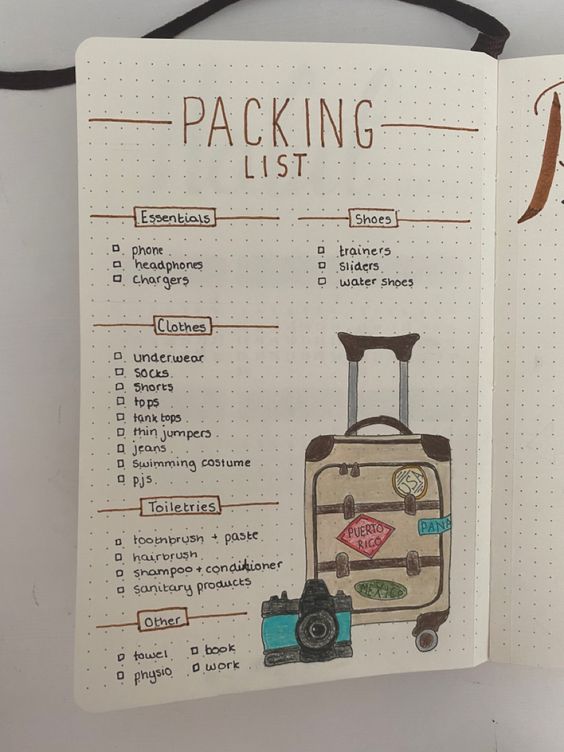
4. Packing List
A packing list spread ensures you don’t forget any essentials. Organize your packing list by categories such as:
- Clothing: Tops, bottoms, outerwear, footwear, and accessories.
- Toiletries: Shampoo, toothpaste, skincare, and personal hygiene items.
- Electronics: Phone, camera, chargers, and adapters.
- Documents: Passport, tickets, reservations, and travel insurance.
- Miscellaneous: Books, snacks, travel pillow, and other personal items.
Check off items as you pack to ensure you’re fully prepared.
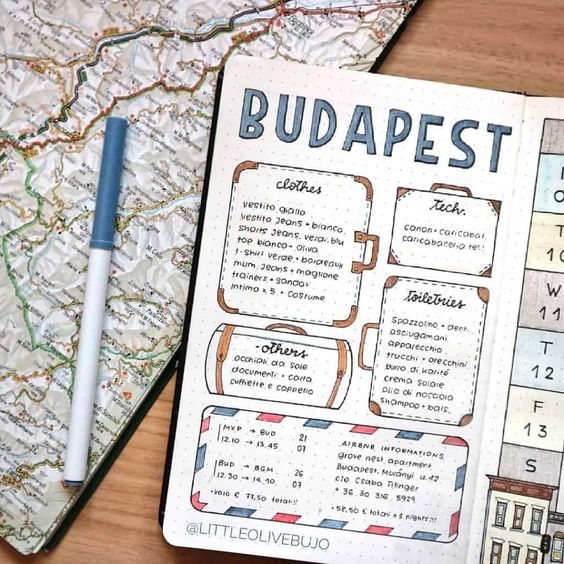
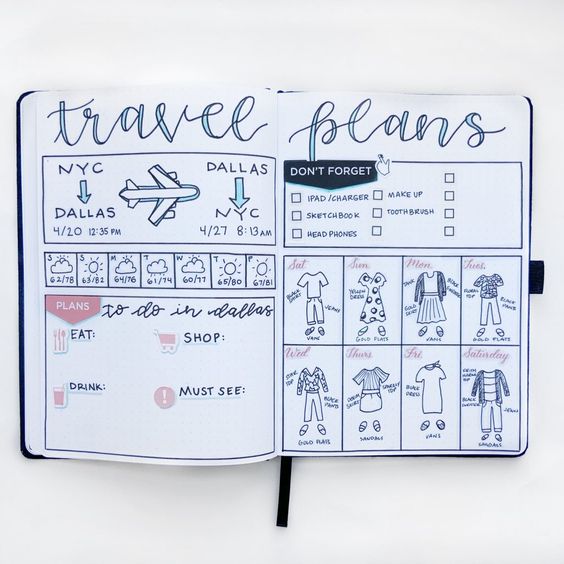
5. Pre-Trip Checklist
A pre-trip checklist helps you take care of all the necessary preparations before you leave. Include tasks like:
- Book Flights and Accommodation: Ensure all reservations are confirmed.
- Research Destination: Learn about local customs, emergency numbers, and transportation options.
- Notify Bank: Inform your bank of your travel plans to avoid issues with your cards.
- Pack: Complete your packing list.
- Household Tasks: Arrange for pet care, hold mail, and secure your home.
This spread ensures nothing is overlooked in the hustle and bustle of pre-trip preparations.
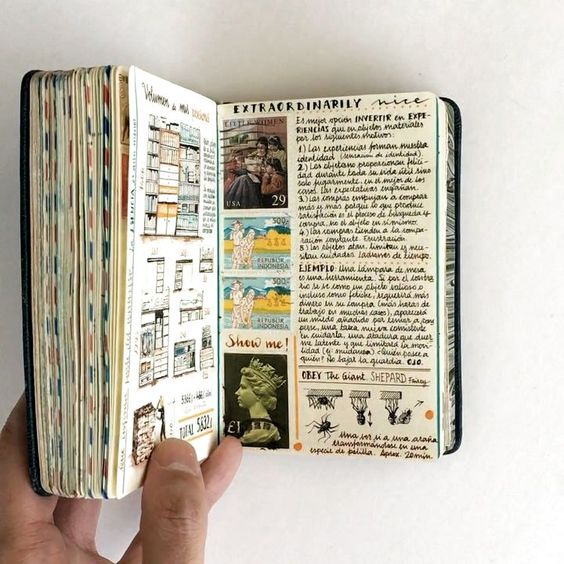
6. Travel Journal
Create a travel journal spread to document your experiences. Include:
- Daily Entries: Write about your daily activities, thoughts, and feelings.
- Highlights: Note down the best moments, favorite places, and memorable interactions.
- Photos and Mementos: Add small photos, ticket stubs, and other keepsakes.
- Doodles and Sketches: Capture scenes or items of interest with quick sketches.
A travel journal helps you preserve memories and reflect on your journey.
7. Souvenir and Gift List
Keep track of the souvenirs and gifts you plan to buy. Create sections for:
- People: List family and friends you want to buy gifts for.
- Ideas: Note down potential gift ideas for each person.
- Purchased: Check off items as you buy them.
This spread ensures you don’t forget anyone and helps you stay organized with your souvenir shopping.
8. Language Cheat Sheet
If you’re traveling to a country where you don’t speak the language, a cheat sheet can be incredibly helpful. Include:
- Common Phrases: Basic greetings, please and thank you, asking for directions, etc.
- Emergency Phrases: How to ask for help, medical assistance, or report a lost item.
- Numbers and Dates: How to say numbers, days of the week, and months.
Having key phrases at your fingertips can make communication easier and enhance your travel experience.
9. Meal Planner
Plan your meals to ensure you try all the local delicacies. Create a spread that includes:
- Must-Try Dishes: List local foods and drinks you want to taste.
- Restaurant Recommendations: Note down restaurants, cafes, and street food vendors.
- Daily Meal Plan: Organize where and what you plan to eat each day.
A meal planner helps you explore the culinary delights of your destination without missing anything.
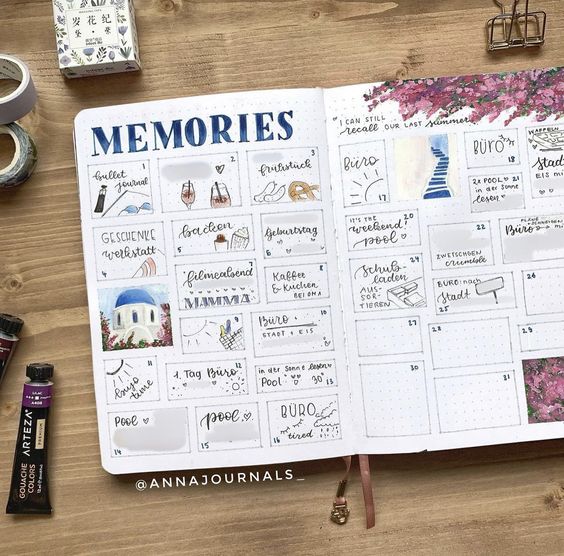
10. Post-Trip Reflection
Once your trip is over, take some time to reflect. Create a spread that includes:
- Favorite Memories: Highlight the best parts of your trip.
- Lessons Learned: Note down any travel tips or lessons for future trips.
- New Connections: Write about new friends or contacts made during your travels.
- Future Plans: Jot down ideas for your next adventure.
A post-trip reflection helps you appreciate your journey and learn from your experiences.

Conclusion
Bullet journaling is a fantastic way to organize and enhance your travel experiences. Your travels are only one thing that can be organized with bullet journaling, check out our articles about all the things you can track with your bullet journal:
45+ Genius Bullet Journal Tracker Ideas You Did Not Think of Yet
Editorial Note: Morella&Ulalume Editors may earn a commission on sales made from partner links on this page, but that doesn’t affect our editors’ opinions or evaluations.
Furthermore the content of this article is for informational purposes only and should not be considered as medical advice. Prior to making any health-related decisions, including the use of supplements or dealing with decisions that can affect your mental health, it is advisable to consult with a qualified healthcare provider.